Bariatric surgery - deals with surgical correction of the digestive system, resulting in weight loss. Bariatric surgery includes various procedures such as gastric bypass, sleeve gastrectomy and other procedures which we will talk about later.
Before we explain how bariatric surgery works, let's go over the steps of the normal nutritional process.
When food enters the oral cavity, the salivary glands start secreting enzymes to help moisten and chew the food. After the food is swallowed, it moves down the esophagus to the stomach where acids are secreted to continue the digestive process. The next step is to move the food to the duodenum, where it mixes with bile and pancreatic juices that speed digestion. This is where most of the dietary iron and calcium is absorbed. The other two parts of the small intestine absorb almost all the remaining calories and nutrients. Food particles that cannot be absorbed in the small intestine remain in the large intestine until they are eliminated from the body.
The stomach can hold about 3 pints of food at a time, which is about 1500 ml. When systematically ingesting more food, the tone of the stomach wall and the sphincters of the intestine weakens, leading to "stomach expansion". The stomach and intestines contain receptors that are responsible for sending a signal to other receptors - the satiety receptors. This point is harder to reach when the stomach walls are dilated. This leads to ingestion of more food and subsequent weight gain.
What are the main methods in bariatric surgery and how do they work?
In cases of severe obesity, treatment with diet and exercise alone may not be enough. Then bariatric surgery intervenes by adjusting certain parts of the stomach and/or intestines, making satiety much easier. There are several mechanisms in terms of achieving the effect. Bariatric surgery works in terms of weight loss by limiting the amount of food that enters the stomach as well as by provoking malabsorption.
Gastric bypass
One of the modalities of bariatric surgery is gastric bypass. It "bypasses" the stomach as food enters the digestive system. It avoids the absorption of calories from the small intestine and provides direct access of food to the stomach enzymes that break it down. A new "stomach pouch" is created that is much smaller and helps to reduce the need for smaller portions of food, and therefore the calories taken in. This leads to changes in gut hormones. These promote satiety, suppress hunger and stop one of the main mechanisms for inducing insulin resistance.
Manual gastrectomy
Another method associated with weight reduction is laparoscopic sleeve gastrectomy. It is performed by removing approximately 80 % from the body of the stomach. The remainder is a banana-shaped tubular pouch. Again, the smaller volume of the stomach and reduced amount of food intake is relied upon. The bigger impact, however, is on the endocrine system of the gut, which is responsible for the sensation of hunger, satiety, blood sugar control. Through this method, glucose regulation is achieved even before weight loss occurs.
In whom is bariatric surgery applied?
Bariatric surgery is an option for overweight and severely obesity. The main indicator is body mass index (BMI). For clinically severe obesity BMI > 35/40 is considered. In these cases, comorbid health problems such as diabetes, heart disease or sleep apnoea.
Metabolic surgery patients are most often adults who have difficulty losing weight and adhering to a strict diet.
However, there are also cases in which patients are young people whose health is at risk due to severe obesity. This step is taken if the child is over 14-15 years of age and has an unsuccessful weight loss attempt of at least 6 months.
In addition to weight loss and reduction of insulin resistance, bariatric surgery also affects some comorbidities such as:
- Gastroesophageal reflux disease
- Cardiovascular disease
- Arterial hypertension
- Severe sleep apnea
- Cerebrovascular disease'
Choosing a good specialist to perform the surgery is important.
But no less important is the personal responsibility of patients after the intervention.
Lifestyle adjustments are needed according to predisposition and cause of weight gain, as well as individual nutritional needs.
We will note some extremely important points after metabolic surgery:
hydration
- First of all, it is imperative to stay well hydrated. The amount of water you need to take in for the day is calculated on an individual basis, but varies between 1.5l - 3l daily. Water should be taken in small sips and divided into portions, a glass of water 15-30 minutes before a meal is recommended. Avoid drinking water during meals as excess gas, bloating occurs and food does not undergo the necessary processing in the stomach.
feeding
- During the first week after surgery, it is necessary to take liquid or soft food, gradually switching to a normal BALANCED diet. You should have between 60-100 g/day of protein in your menu, at the expense of carbohydrates. By taking mainly protein and fiber, you are allowing your body to draw calories from the stored fat in your body. Carbohydrates should be slow /potatoes, rice, pulses/ and be in the right ratio to protein and fat. After a bariatric treatment, an individual recommended diet is made, which is calculated based on your nutritional needs and the outcome you are looking for. It is recommended that this diet becomes your diet for life.
vitamins
- Since the amount of food ingested and the malabsorption of vitamins decreases, it is very important to take a vitamin complex in a form convenient for the patient. The specialists taking your treatment give instructions on the amount needed according to individual needs.
If you are taking medications for other medical indications, they may be stopped or the dosage adjusted. The reason is that some medications interfere with the stomach lining and metabolism of substances.

Recommendations
- In terms of bad habits, surgeons recommend stopping all nicotine products and alcohol intake even before surgery. It is highly recommended that this remains the case after surgery because nicotine interferes with the body's recovery and exposes patients to risky post-operative conditions. After surgery, alcohol is absorbed into the bloodstream much more quickly than usual, which inhibits the body's recovery functions and the liver.
Sports
- The sport. Typically, after bariatric surgery, patients report that they are "bursting with energy." Frequent exercise starting immediately after surgery is a good way to encourage the recovery process. Movement immediately after surgery, however, should be measured and gentle walking. Every patient is different and has different motor capabilities. The surgeon advises when active exercise can be started and how heavy the workload should be.
Once the patient is fully recovered, it is mandatory to have about 30 minutes per day of moderate-intensity exercise. This will help to seal in the effects of all the effort - yours and the bariatric surgery specialist's.
asdasd
- We mentioned that bariatric surgery also helps many overweight and hormonally imbalanced ladies to get pregnant. It is important, however, that this step should not be approached earlier than 12-18 months after surgery. Women who plan to become mothers after bariatric intervention should reach a healthy weight but also have sufficient quality nutrition. That is, before this action is taken, it is good for the patient to consolidate a balanced lifestyle. This will avoid recurrence of the problem and ensure normal course of pregnancy.
laboratory tests
- Every few months, patients should be followed up by the treating physician, as obesity is a chronic condition. It is good to periodically perform laboratory tests, which include, for example: ferritin, vit.B12, folic acid, vit.D and other indicators at the discretion of the doctor, which will show the objective condition.
Before undergoing bariatric surgery, most people followed far stricter diets and endured great restrictions. In this light, the postoperative requirements present no difficulty.
After surgery, some patients believe that "single transgressions" would not affect, since the stomach can not take much food. It is this point that appears to be to blame for returning the problem to baseline, as the psychological mindset is at the root of becoming overweight.
Gastroplasty
Bariatric, but not surgery, is the new weight loss method that is available in a limited number of places in the World. We are fortunate to be working with a team that is well versed in this approach that produces successful results.
Endoscopic gastroplasty - a non-surgical procedure that reduces the volume of the stomach.
You may encounter the procedure as a "Sleeve Gastroplasty", which should not fool you into thinking it is synonymous with a "Sleeve Gastrectomy" or "Sleeve Gastrectomy".
What is endoscopic gastroplasty?
Primarily, this is a procedure with the effect of bariatric surgery, but weight loss is achieved through endoscopic access to the stomach. In this method, an endoscope is introduced through the mouth to reach the stomach, after which its walls are sutured so that it assumes a tubular shape. Thus, by reducing the volume of the stomach, the volume and amount of food that can be taken in is also reduced. Endoscopic gastroplasty is a good alternative for people who are afraid to undergo bariatric surgery or are not suitable for surgery.
Although the effect of the innovative method is analogous to the effect of bariatric surgery, it is important to mention that there are some differences with regard to this.
When is it best to do it?
The endoscopic bariatric method is the first choice for patients who have already undergone bariatric surgery with subsequent recurrence of weight gain. It is also used in cases where the BMI is no higher than 40 - otherwise the patient needs to have a surgical technique applied.
Endoscopic gastroplasty is a good "second chance" option for patients who have underestimated the importance of a healthy and balanced lifestyle after bariatric surgery. In these cases, the stomach begins to dilate, and endoscopic gastroplasty can help get the patient back "on the right track." This is provided no further lifestyle mistake is made.
The endoscopic sleeve gastroplasty bypasses the discomfort after surgery and recovery occurs within the day. In cases where patients undergoing an endoscopic procedure have other medical conditions or complicating factors, an overnight stay in a hospital setting is required for monitoring.
The procedure lasts 60-90 minutes and is performed under general anesthesia. No food is taken for 4 to 6 hours after the procedure.
The resumption of normal feeding is analogous to the regimen followed after any bariatric intervention. From liquid to soft food within a few weeks, after which solid, heavier food is allowed. It is important to emphasize that here too - in endoscopic gastroplasty - the patient's personal commitment to a healthy lifestyle is of utmost importance.
Key benefits:
All the beneficial effects of bariatric intervention, including:
- without wounds and scars
- less postoperative pain
- the natural process of digestion is not altered
Expected result:
The weight loss process begins immediately after the procedure with rapid weight loss up to the 3rd month, after which the weight loss slows down. With a responsible attitude on the part of the patient, a weight reduction of up to 25% from baseline is achieved as early as the end of the first 1 year.





